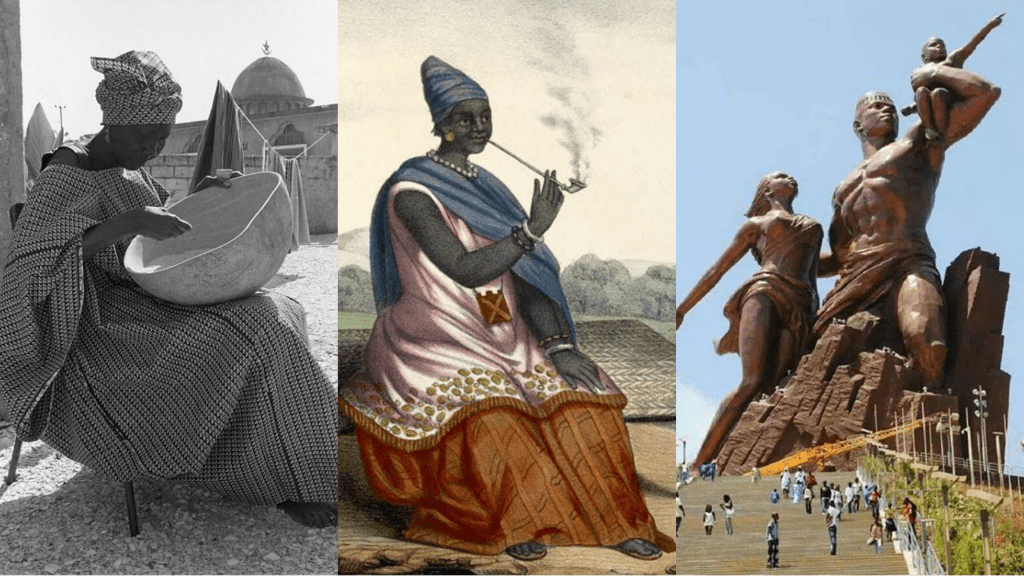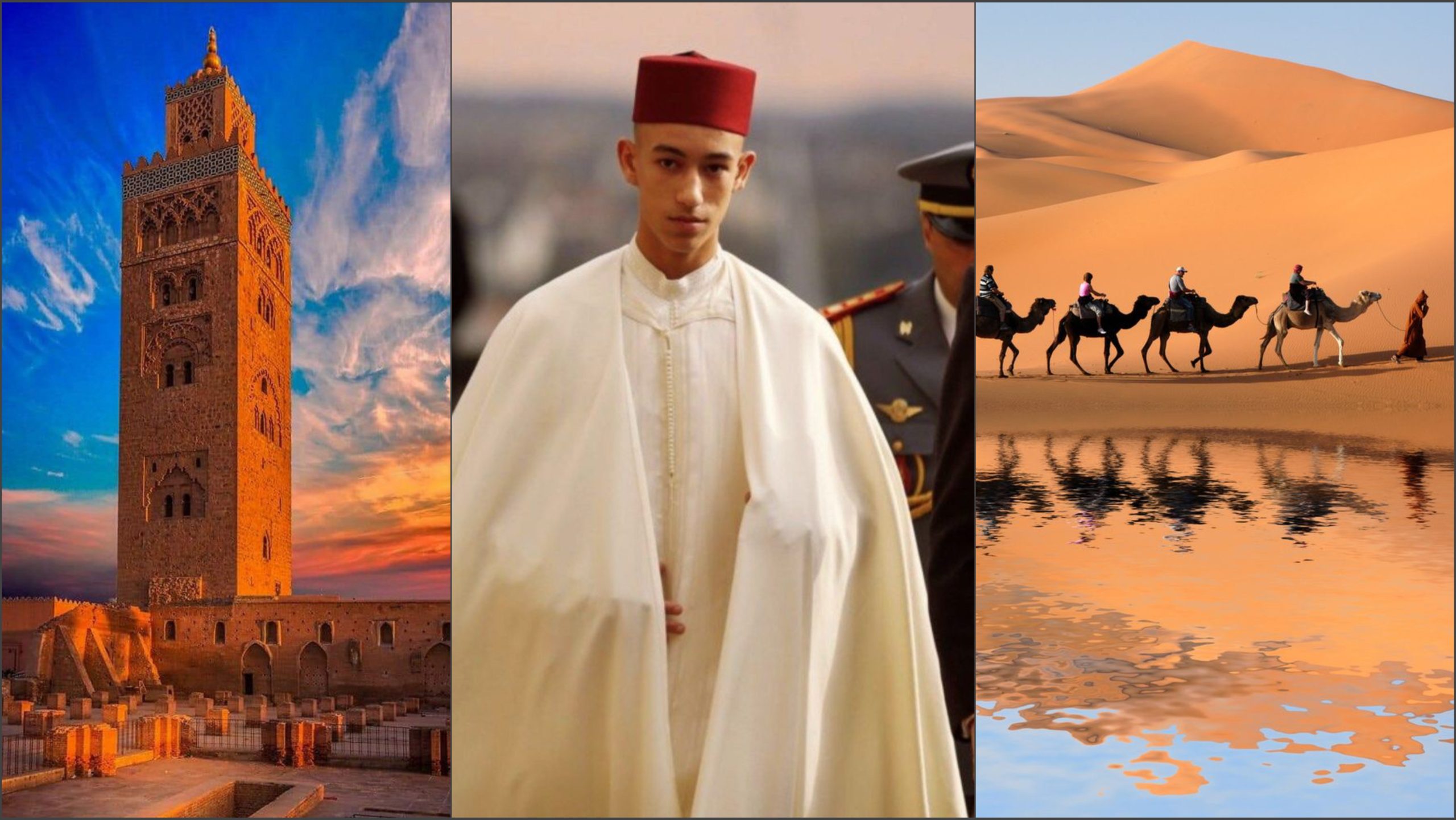The Jolof Empire, also known as the Wolof or Wollof Empire, was a West African state that ruled parts of Senegal from 1350 to 1549. Following the 1549 battle of Danki, its vassal states were fully independent; in this period it is known as the Jolof Kingdom.
Origins
Traditional Wolof accounts indicate that the state’s and empire’s founder was the perhaps legendary Ndiadiane Ndiaye (also spelled Njaajaan Njaay). Traditional accounts of this leader’s ancestry differ.
The legend claims that he was “the first and only son of a noble and holy “Arab” father Abdu Darday and a “Tukuler” woman, Fatamatu Sall,” according to James Searing. This gave him an Almoravid Islamic ancestry and a maternal relationship to Takrur.
“Njaajaan Njaay delivers his first words in Pulaar rather than Wolof in all variants of the narrative,” James Searing adds, “emphasizing once again his character as a stranger of noble ancestry.” Sallah says about his origins: “Njajan is said to be the son of Abu Darday, an Almoravid conqueror who came to Senegal from Mecca to preach Islam… According to legend, Njajan Njai was a mysterious Fulani man. Some speculate that he was a Serer prince.”
It has been believed that the empire’s roots were laid by the voluntary combination of numerous tiny states, beginning with Waalo in the north, and that Waalo was divided into villages controlled by distinct monarchs using the Serer title Lamane immediately prior to the empire’s establishment.
Ahmad Abu Bakr, also known as Ahmadu Abubakar, was Ndiadiane’s father. The story of Ndiadiane Ndiaye starts with a disagreement over wood near a famous lake. This nearly resulted in bloodshed among the kings, but the inexplicable arrival of a stranger from the lake intervened. The visitor then divided the wood evenly and vanished, leaving the people speechless.
When the stranger returned, the people pretended to have a second disagreement and seized him. They offered him the throne of their kingdom and persuaded him to take it by promising him a beautiful woman to marry.
When the occurrences were relayed to the Sine’s monarch, who was also a brilliant magician, he is said to have exclaimed in awe, “Ndiadiane Ndiaye” in his native Serer language. The monarch of the Kingdom of Sine (Maad a Sinig Maysa Wali) then advised that all rulers between the Senegal and Gambia rivers bow to this guy voluntarily, which they did.
Fearing that this “Most versions of the legend describe how the new dynasty arose from a pre-existing social system ruled by the Laman, Wolof elders who claimed “ownership” of the land as descendants of village community founders.
Under the new monarchical order, the laman kept many of their roles, becoming a form of minor nobility inside the new kingdom and functioning as electors when it came time to choose a new king from the Njaay dynasty.”
According to historians, “the rise of the empire was associated with the growth of Wolof power at the expense of the ancient Sudanese state of Takrur, and that this was essentially a fourteenth-century development.” While dates in the early 13th century (and others say the 12th century) are usually ascribed to this king and the founding of the empire (and others say the 12th century), a more likely scenario is “that the empire was associated with the growth of Wolof power.
Early history
For much of its early existence, the new state of Djolof, called for the center province where the king resided, was a vassal of the Mali Empire. Until the second half of the 14th century, Djolof remained within the empire’s sphere of influence.
The Jolof became permanently independent during a succession dispute in 1360 between two opposing lines within the Mali Empire’s royal bloodline. A closer look at Jolof’s sociological and political structure reveals that at least some of its institutions were either directly borrowed or developed alongside those of its larger predecessor.
Women in Imperial Jolof
Intermarriage was frowned upon among the various classes. Women were unable to marry higher-ranking men, and their offspring did not inherit their father’s position. Women did, however, have some power and influence in government.
The Linger, often known as the Queen Mother, was the head of all women and a powerful figure in state affairs. She was the owner of various communities that planted farmland and paid her direct tribute. Other female chiefs were primarily responsible for judging matters affecting women. Women were allowed to aspire to the position of Bur and administer the empire’s most northern state, Walo.
Political organization
Waalo, Kayor, Baol, Sine, and the Kingdom of Saloum were the five coastal kingdoms that made up the Jolof Empire, which ran from north to south. The landlocked state of Jolof was a tributary of all of these states. The Bour ba, the monarch of Jolof, governed from Linguère’s capital. Each Wolof state had its own ruler, who was chosen from the descendants of the state’s founder.
The Bour was chosen by a college of electors that included the rulers of the five kingdoms, while state rulers were chosen by their individual nobility. The Bour of Waalo, the Damel of Kayor, the Teny (or Teigne) of Baol, and the two Lamanes of the Serer states of Sine and Saloum were among those present. Each ruler had practical autonomy, but was expected to work with the Bour on defense, trade, and imperial revenue.
Once in office, officeholders underwent complex rites to familiarize themselves with their new responsibilities as well as raise them to heavenly status.
They were supposed to lead their states to glory from then on, or else the gods would proclaim them unfavored and oust them. The strains of this political structure produced in a profoundly autocratic regime, with personal armies and money frequently taking precedence over constitutional norms.
According to Serer tradition, Ndiadiane Ndiaye and his descendants at Jolof were never paid tribute by the Kingdom of Sine. It goes on to say that Jolof never conquered the Sine, and that Ndiadiane got his name from Maysa Wali’s tongue (king of Sine).
“Each subordinate kingdom—Walo, Takrur, Kayor, Baol, Sine, Salum, Wuli, and Niani—recognized Jolof’s dominion and paid tribute,” according to Sylviane Diouf.
 The African History Truly African
The African History Truly African

